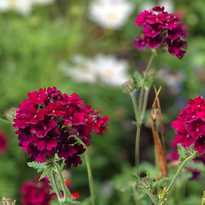Chelsea

Chelsea discussed her experiences with interstitial cystitis (also known as bladder pain syndrome, involving pelvic pain and problems peeing). She first developed urinary urgency with her first pregnancy and has been dealing with it ever since. She currently receives bladder instillations, which have made a "big difference".
Chelsea is married and has two teenage children. She keeps busy with parenting and volunteer work. Her ethnicity is White-British.
Condition: interstitial cystitis/bladder pain syndrome
More about me...
During her first pregnancy, Chelsea noticed that she needed the toilet much more often than before. She needed to use the toilet every 15 minutes and felt a continual ache in her bladder. She assumed this was part of pregnancy but found that it continued after having her baby. Chelsea went to see her GP, who "couldn't understand it", and prescribed her tablets. These were ineffective, and Chelsea's symptoms continued even after her second pregnancy. Chelsea did not seek medical advice as it had been unhelpful before.
Years later, Chelsea chose to pursue medical care again after not going to a destination wedding because of her urinary concerns. Her urogynaecologist performed an urodynamic analysis, and the test showed that Chelsea's bladder capacity wasn't the source of her symptoms. Following a cystoscopy, Chelsea was diagnosed with interstitial cystitis (also known as bladder pain syndrome, involving pelvic pain and problems peeing). Chelsea had previously never heard of the condition. Still, she found comfort in a diagnosis reflecting that "this is definitely what's wrong". She was a bit confused about the difference between her condition and standard cystitis but couldn't find much information about it online.
Doctors told Chelsea that bladder instillations were the only treatment for interstitial cystitis. While the instillations offer some relief, they cannot cure the condition. Chelsea says the instillations "make a big difference" in managing her discomfort. The medication is distilled into her bladder every few months, and after a few days, Chelsea's urinary urgency decreases.
Chelsea can contact the hospital directly by phone, which she finds "nice and straightforward". After six months, a new GP referral is required, which has at times been a "nightmare" to sort the paperwork for. Chelsea is concerned that her GP's office staff do not understand interstitial cystitis, as she gets "that feeling of having to describe your condition every time". The Covid-19 lockdown and understaffing of trained nurses have also made it difficult at times to receive treatment. Chelsea is currently able to receive her instillations routinely. While they are "not particularly pleasant", she considers them to be just "part of my life now".
Throughout her experience with interstitial cystitis, Chelsea has had to consider her bladder while going about her daily activities. Activities like working, going to the theatre, and singing in a choir became a source of anxiety as she found herself fixated on "looking for your exit route". Chelsea and her husband have delegated activities with their children based on her bladder needs. Her husband has been "very understanding", and her symptoms haven't caused significant problems to their relationship. Chelsea's children also understand her condition and keep an eye out for public toilets when they're in public.
Chelsea feels fortunate that she has been able to sleep through the night and that her symptoms fluctuate in severity. She has found that at times she can "work through" the ache and go for a few hours without needing the toilet. Chelsea is open to telling friends and acquaintances that she has a bladder condition. At the moment, Chelsea tries to find "balance" between living her life and dealing with her bladder issues. She does worry about how her interstitial cystitis will affect future events like her children's graduations but chooses not to dwell on this. Chelsea feels that there is "no point in just totally letting it control everything".
Chelsea would like to improve medical services through changes like having toilet facilities noted as an accessibility need. She has routinely had issues accessing toilets in public. She wants people to know those requesting toilet facilities may have health conditions. Chelsea discussed how "vital" nurses are to the overall system, and that understaffing can leave patients in avoidable discomfort. Chelsea encourages other people struggling with interstitial cystitis that "there are ways to find your way through it".


